Text
A Little Ditty About “Star Wars: The Last Jedi” (Heard of It?)
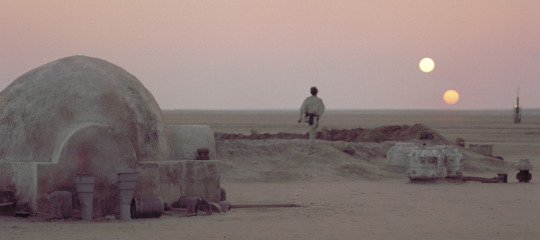
Star Wars has been ubiquitous in pop culture for my entire life (31 years to date), and I would guess there have been more words on the internet devoted to loving or hating George Lucas’ (and his recent successors’) creations than just about anything else.
I don’t want to blow any more hot air than absolutely necessary about director Rian Johnson’s new film, but due to my personal circumstances, as well as what seemed to be a strong effort behind-the-scenes to surpass our expectations and surprise us, I wanted to say a few things about “The Last Jedi.”
These movies have always been enjoyable spectacles, even the reviled prequels, but they haven’t always stirred the soul. With this eighth chapter in what we’ve been told is a nine-part saga of the Skywalker family and their legacy, I felt a genuine beating heart from the first frame to the last.
What made this chapter distinctive for me is the way it constantly situated the franchise-long conflict between darkness and light on a personal level, with each character facing their own crisis of faith in the struggle for survival (the Rebels) or domination (The Empire-er...First Order).
Life is messy, and rarely binary in the way The Force of those first films tended to suggest. This is most powerfully articulated in this film’s version of Luke Skywalker, who couldn’t be more different than the hopeful, victorious leader of “Return of the Jedi.”
There is a fierce honesty to the galaxy’s greatest hero’s choice to sit out the story’s raging conflict, wounded by a terrible failure we only learn about in bits and pieces. The way Luke’s storyline unfolds is a timeless reminder of how guidance is always available if we can overcome our fears and listen, and that salvation lies in our connection to each other.
These concepts express themselves through a host of newer characters, most of whom I enjoyed for their fighting spirit in the face of near constant doom and collapse. It was a joy to witness this vision of Star Wars in which the blue collar “ham and eggers” get to be heroes, and women and people of color get to be strong and participate purposefully in the story.
Carrie Fisher passed away near to last Christmas, before the movie had finished post production. As we all know, she was a force of nature and incredible wit, and one of the most moving things “The Last Jedi” does is preserve her spirit and take her off the sidelines.
The film emotionally closes with a scene indicating that heroism, strength and goodness aren’t just available to people with a royal last name, but to anybody with the will to rise to the challenge. In these times where the sky seems grey and the news can be pitch black, it’s a lesson needed now more than ever.
0 notes
Text
My Uncut Love for “Blade Runner: 2049″ Hasn’t Diminished (And Probably Never Will)
It’s been months since Denis (Sicario, Prisoners, Arrival) Villenueve’s sequel to Blade Runner was unveiled to American audiences, and in an unfortunately surprising twist of fate, many of us Yanks didn’t show up to watch it.

As soon as those first exhilarating trailers struck social media, I fully expected Blade Runner 2049 to be the instant cultural phenomenon Ridley Scott’s original film never was - vindicating Blade Runner’s decades-long crawl from cult curio to global ubiquity, and reviving the moviegoing public’s obsession with replicants, spinners, origami, steaming food truck noodles, and Johnnie Walker sipped from those gorgeously sculpted tumblers.

If you’ll indulge me while I do a little bean counting, Blade Runner 2049 cost in the ballpark of $150 million to make. In those first few weeks of release, audiences eventually bought enough tickets to raise the domestic total to $83 million. This disparity lead many to construe Blade Runner 2049 as a box office bomb and all-around disappointment, even though foreign box office handily netted producing partners Warner Bros., Alcon Entertainment, and Columbia Pictures an additional $142 million. I haven’t a doubt that it’ll break even when the dust finally settles.

At the risk of sounding trite, I’ll assert that matters of business and budget have zero to do with Blade Runner 2049′s cinematic merit, no matter what trades like The Hollywood Reporter might suggest. The essence and quality of any movie need only be valued by the sound and picture flickering from within the big bright rectangle. Everything else is just noise.
When the nerd holiday of Blade Runner 2049′s opening weekend finally arrived, I watched it on the best and largest screen I could, joined by a little fellowship of family, friends and coworkers. The verdict?
Few would deny that 2017′s timeline has been a non-stop deluge of terror and portent. Everything from politics and national tragedy after national tragedy to my own personal quagmires had left me craving the escape of Blade Runner’s unmistakable brand of sci-fi super-noir. Villenueve’s lavish sequel couldn’t have come along at a better time.
Once a certain father met his long-lost daughter and the movie cut to black and credits, the lights went up. My party went their separate ways, and I sullenly returned to a life bearing little resemblance to the vivid landscapes in which I had swam for three blissful hours of lucid dreaming.
The best films establish permanent residency in our creative imaginations. We long to inhabit them, even after the theater is empty and the ushers are sweeping stale popcorn away from our feet. 2049 was one such experience for me.
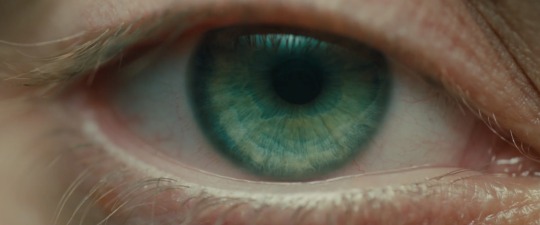
Despite the enormous volume of criticism already generated, I thought I’d offer my detailed take on it anyway.
In an effort to keep this essay wide-ranging and interesting, I’m going to have to spoil much of the narrative. Please watch the movie already, so we can diffuse any risk of ruining the movie’s many delightful surprises...
The advertising campaign for 2049 was brilliant at both enticing hardcore Blade Runner fans with throwbacks to the many things that made that film so iconic and unforgettable, while also giving the curious uninitiated a comprehensive tour of the countless appealing visual and thematic qualities that could be enjoyed separate any primer or context.
Each trailer seamlessly obfuscated practically every aspect of the plot that had the potential to be a narrative surprise - Except, of course, for the presence/return of a grizzled-as-hell Rick Deckard (Harrison Ford).

I was thrilled to discover upon first viewing that Ryan Gosling’s “Officer K” is himself a replicant - a cop working for icy LAPD Lieutenant Joshi (Robin Wright, unsurprisingly perfect) to snuff out certain older model replicants who managed to slip into lives of anonymity before their corporate overseers put out a product recall.
It’s easy to draw parallels between Gosling’s Officer K and today’s American ICE stormtroopers. 2049′s first onscreen replicant (played with gentle grace by human redwood trunk Dave Bautista) is brutally “retired” by Gosling while a pot of garlic boils on a range top nearby. This jolt of an opening scene deftly introduces us to a robot humbly trying to adopt a simple human life, eking out a peaceful existence in solitude, living off the grid as a protein farmer.

Using Gosling’s K as the button man, Bautista’s character Sapper Morton is brutally gunned down by the technical arm of 2049′s despicable government, crystallizing the black-hearted fascism of this future vision of LA. By the end of the sequence, 2049 manages to both brilliantly depart from and add to Ridley Scott’s established world of monolithic corporations and their mutinous android labor force.
As a movie obsessive who has always believed Rutger Hauer’s Roy Batty (the antagonist from the first film) had Blade Runner’s most charismatic screen presence AND emotionally involving story arc, the decision made by Villenueve and Ridley Scott to tell 2049′s story through the eyes of a replicant instead of a human is an inspired one.
Gosling’s Agent K is a Good German whose only extra-professional pastime is the oddly touching Stepford-meets-Siri romance he carries out with “Joi,” a holographic fellow AI. Joi adds compelling new layers to 2049′s preoccupation with the line (if we decide there even is one) separating humans from replicants.
According to blind zillionaire industrialist Niander Wallace (Jared Leto, adding another tic-filled personality to his growing gallery of loathsome weirdos), the continued and assured inability of replicants to conceive children is essential to keeping his legions of android slaves subservient. In the world of 2049, Wallace is a sort of God (or Pharaoh, as his incredible pyramidal fortress seems to signify), and replicants who reproduce of their own free will would be a mortal threat to this Pharaoh’s monopoly on slavery and world expansion.

The ideas surrounding Wallace are articulated in a violent and disturbing scene that completely repelled me upon first viewing (men’s prodigious violence towards women is a subject I’m frankly exhausted to see dramatized during these dark days), in which Leto pontificates about his ambitions while sterilizing a newborn replicant by taking a knife to her uterus.
Wallace has built - and continues to expand - an empire to rival Alexander’s, and that God complex seems to have allowed his absurdly grandiose ego to eclipse any considerations of morality or human compassion. He’s a creep.
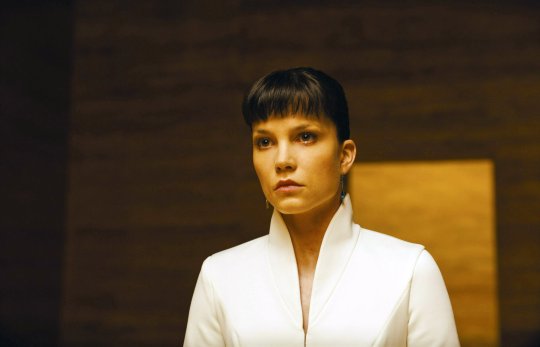
As Wallace leaves his chattel bleeding and naked in the same spot she was minutes-ago conceived (presumably to be shuttled to some salt mine or brothel "off-world”), Wallace’s personal secretary Luv (an advanced model replicant played by Sylvia Hoeks), sympathetically regards the brutalized woman from a sentry position nearby, tears streaking across her otherwise stoic, painted face. So much is already happening beneath the surface in this film.
Through Luv, Villenueve continues contrasting human characters with scant empathy and monstrous cruelty with replicant characters who have deep reverence for life’s creation and preservation, be that human life or the lives of other replicants.
Luv's attitudes lie somewhere in the middle of that spectrum. A scene-stealer from minute one, Luv is first introduced as an HR cipher sent forth to meet K as his investigation takes him deeper into the halls of power. When she needs to be, Luv is a polite charmer and the world’s most attentive and fastidious secretary, but she can also be an asset when a coroner's head needs to be squashed like a melon, or when the chief of police requires violent interrogation at knifepoint or with shattered glass.
Luv’s finest moment of effortless aggression might just be her casual drone-bombing of a junkyard Gosling’s K investigates during a crucial sequence - she has a manicurist do her nails on one hand while she fires a volley of mortars via iPad with the other.
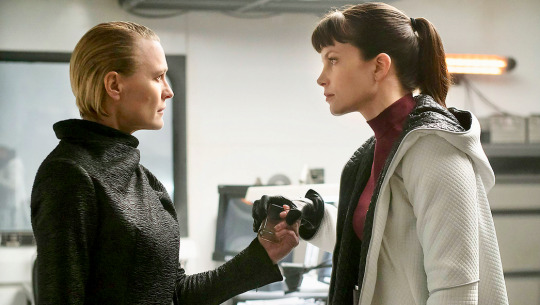
The crux of the film is the gradual unveiling of K’s identity, followed by an interesting subversion of what I initially assumed was a fairly predictable twist. K’s chief assignment is to kill the hidden offspring of Rachael (the replicant played by Sean Young in Blade Runner) and the long-absent Rick Deckard (Ford).
K finally deduces that he may very well be Deckard’s son, which throws his entire code of ethics and sense of purpose into disarray. He goes on the lam from his oppressive LAPD handlers to find Deckard and determine whether this whole “being half human with actual, non-implanted memories” bombshell revelation has genuine merit.

There are several amusing scenes seeded throughout the movie in which Officer K has to take a psychological evaluation or “baseline test” (conducted by an asshole robot, of course). In the early part of the film, K suffers zero identity crisis, so he passes the test with flying colors. But as his case begins to unravel the assumptions he had long held about himself and the system he serves, K’s answers to the robot’s questions become more erratic and threatening to his handlers.
A transcript of the first test might be worth printing verbatim here...
Interrogator: "Recite your baseline."
K: "And blood-black nothingness began to spin... A system of cells interlinked within cells interlinked within cells interlinked within one stem... And dreadfully distinct against the dark, a tall white fountain played."
Interrogator: "Cells."
K: "Cells."
Interrogator: "Have you ever been in an institution? Cells."
K: "Cells."
Interrogator: "Do they keep you in a cell? Cells."
K: "Cells."
Interrogator: "When you're not performing your duties do they keep you in a little box? Cells."
K: "Cells."
Interrogator: "Interlinked."
K: "Interlinked."
Interrogator: "What's it like to hold the hand of someone you love? Interlinked."
K: "Interlinked."
Interrogator: "Did they teach you how to feel finger to finger? Interlinked."
K: "Interlinked."
Interrogator: "Do you long for having your heart interlinked? Interlinked."
K: "Interlinked."
Interrogator: "Do you dream about being interlinked... ?"
K: "Interlinked."
Interrogator: "What's it like to hold your child in your arms? Interlinked."
K: "Interlinked."
Interrogator: "Do you feel that there's a part of you that's missing? Interlinked."
K: "Interlinked."
Interrogator: "Within cells interlinked."
K: "Within cells interlinked."
Interrogator: "Why don't you say that three times: Within cells interlinked."
K: "Within cells interlinked. Within cells interlinked. Within cells interlinked."
Interrogator: "We're done... Constant K, you can pick up your bonus.”
- -
Such is the cross the obedient replicants of 2049 need to bear.
The movie is long and weighty, but never a chore to watch or difficult to follow. If memory serves, top-billed Harrison Ford (as iconic replicant killer Rick Deckard) doesn’t even appear onscreen until two hours in, but his applause-worthy arrival enhances the movie without drawing any interest away from Officer K. Once Gosling’s investigation brings him to the doorstep of Deckard’s booby-trapped casino hideaway (itself contained in a stunningly radioactive, vacant and dust-caked future vision of Las Vegas), the movie’s costars initially face off as adversaries before finally forming an uneasy partnership to speak truth to power, and - on a more human level - reunite Deckard with his long-lost progeny.
I suppose it’s in this last stretch of the film that director Denis Villenueve’s soul bares itself in a way that distinguishes this new film from its famous predecessor. Instead of culminating in any kind of epic conflict affecting global change, or placing the replicant vs. tycoon class war center stage, the movie narrows its focus on what Gosling chooses to do as he contemplates whether he is human or not, and what the distinction really means to him.
The finale’s centerpiece is a vicious physical contest between replicants K and Luv on the shores of future LA’s “Sepulveda Wall,” where a spinner/prison transport vehicle has crash landed and sinks gradually into an onslaught of crashing waves. As the warriors clash nearby, a handcuffed Deckard watches patiently and waits for what could just as easily be his demise rather than his salvation.
By rescuing Deckard from certain death, K liberates himself from his previously programmed destiny, as well as any selfish baggage we can agree is very key to the human condition. Lying in the snow, bleeding out in 2049′s poignant final moments, K finds peace in having healed the only part of the world he could.
I couldn’t end a review like this without tipping my hat to the genius DP Roger Deakins, who I would insist is as much an author of 2049 as Villenueve or Ridley Scott. It was wise to select a cinematographer whose visual ambition matches the subject and content of a movie so epic and complex, and the result - hyperbole be damned - is one of the most gorgeous movies I’ve ever seen.
In a movie designed from the ground up to convincingly plunge us into an endless procession of jaw-droppingly unique and visually stunning environments, Deakins never fails to precisely, carefully discover inspired new ways of capturing the work of his similarly gifted production designers, costumers and effects artists. If there’s one aspect of 2049 that would be obvious to anybody from frame one, it’s the confident belief that the visual experience of the movie ahead is going to be unmatched and unprecedented.
“Blockbusters,” which I suppose describe any kind of film made with a large budget, featuring movie stars and wielding all of the trappings necessary for worldwide distribution, can be a tiresome proposition for those of us that consume movies frequently and ask a little more from the cinema experience than some of our less-discerning peers.
Blade Runner: 2049 accomplishes everything movies of this scale and pedigree tend to attempt, does so with perfection, and then reaches for (and attains) even higher levels of technical, narrative, and performance ambition. This truly is a tentpole Harrison Ford action movie that is also without question an “art film,” entertaining from the surface to the core, and dense with subtext, intriguingly unanswered questions and hauntingly iconic images. It will stand the test of time as all great movies do, and impressively earns its proud place alongside the revered sci-fi film that inspired it.
youtube
0 notes
Text
2014 - The movies and the life.
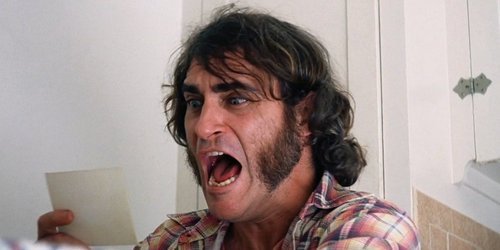
2014 WAS a difficult year.
For a long while I had a hell of a time finding work, I had some family conflicts, and I was crushed emotionally by a breakup. I found it a Herculean task to access even a little joy in my heart once my eyes fluttered open every morning.
Despite this, I think back and find myself so grateful to the few dear friends who have been there for me in my darkest hours, a therapist committed to helping me work things out, and a family that's encouraging me towards a better place and and remaining supportive despite their foibles (we've all got em!).
And then there's the movies...those beautiful rectangular dream machines, of which I've had a lifelong passion of watching and a lifelong commitment to creating. Due to a litany of personal, mental, and health problems that I won't cloud the meaning of this piece with, it's been difficult for me to write as much as I used to (happily this has been changing), and if you can believe it, there have been more than a few times when I was too depressed to even get out to the theater by myself and immerse myself in the everlasting beauty of the movies (For this reason I haven't yet seen Foxcatcher, Selma, Whiplash, Grand Budapest Hotel, or even frickin' Boyhood!). This bums me out especially, because usually I've been able to turn my mood around through cinema, but the rain cloud above my head these past 12 months has been especially cumulonimbus. I'm striving for this year to be different.
Here are my favorite movies, and why. Please hit me back with yours! And as always, thank you for reading.
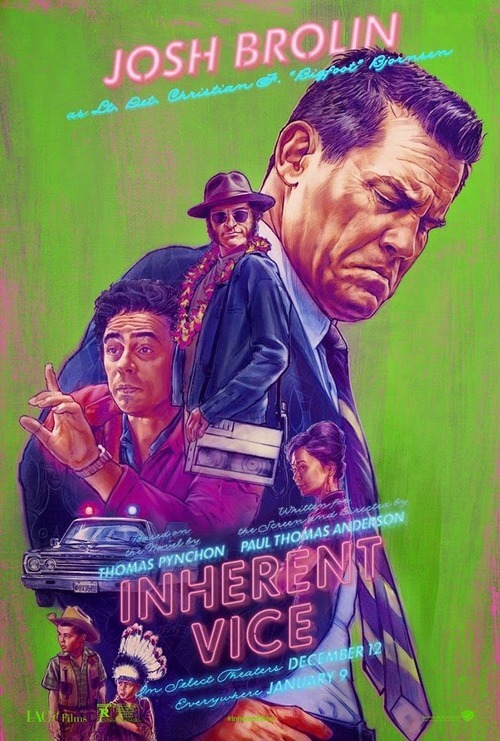
1) INHERENT VICE I was in giggling, manic awe of this movie from start to finish. The new P.T. Anderson joint, based on a sprawling, acclaimed Thomas Pynchon novel is HILARIOUS. Many of you are probably familiar with that great Louis CK bit (http://youtu.be/hLoqhvZ1SZI), where he chastises people for throwing the word "hilarous" around too loosely, but Anderson/Pynchon's work here earns those stripes. I was belly-laughing through almost every scene, and each time in reaction to a new bizarre tonal flavor the movie had concocted, executed by a huge ensemble of just about every great performer that's inhabited the movies we've all loved for the past 20 years. The density of cinematic detail is astounding (apparently Anderson and my fave DP Robert Elswit (all on 35mm!) were inspired by the classic Zucker brothers comedies and wanted to pack each frame to the gills with gags and visual information), the dialogue is complex, intriguing and odd and begs repeat listenings, and the bangin' soundtrack has some great pop on top of a crazy Jonny Greenwood score that evokes "Vertigo". On top of that, there's moments of genuine sweetness that cut through the crazy, mostly having to do with Joaquin Phoenix's Doc Sportello's sweet loyalty to an ex he has every reason to shut the door on. The movie makes you feel awake and alive, a feeling not unlike the one I experienced when I first watched Pulp Fiction, and realized that through sound and vision, movies can work simultaneously on a lot of different levels.
2) TRUE DETECTIVE
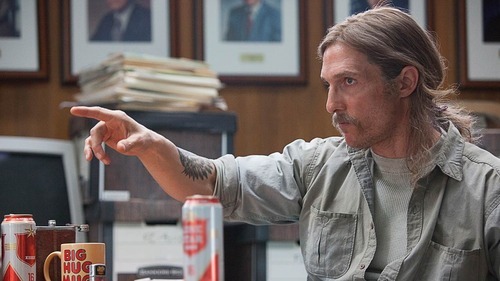
I feel so passionately about this initial foray into Nic Pizzolatto's writing and Cary Fukunaga's direction (this is the exquisite product of a unified vision - the director and writer were consistently committed to each episode) it would feel wrong to exclude it from the list.
It's a richly cinematic, self-contained season of TV, with immense production value and an Oscar-nominated cast. I only wish it could have played in theaters, where it might have blown an expanded audience away.
I have to admit that True Detective treats the female characters in its cast almost shamefully, even if the story takes place in a world of vice where women are fetishized, victimized, encumbered and generally treated as accessories by the booze-stinking men that drive the story. True Detective wouldn't pass the Bechdel test to save its life, though for what it's worth I thought Michelle Monaghan played her part to the hilt with absolute strength and dignity, saving the show from being such a complete masculine meditation.
I can also empathize with those who can't get interested in the slow, world-building opening hours and prefer visceral thrills delivered post haste (Nobody deserves to bitch about that, however, after the insane 7+ minute take in "Who Goes There" rolls around).
True Detective is a gorgeous tapestry of this vivid, oppressive and deeply primal Louisiana atmosphere, a generations-spanning mystery with an appropriately terrifying serial murderer at the center that unravels over 8 hours with careful precision. Maybe most importantly, due to its "framing story" of two older men recalling the span of their lives (and a single murder case) a soulful backdrop bleeds through of contrasting philosophies between characters about man and God, lies and fidelity, goodness and badness, hope and hopelessness. "If you ask me, the light's winning." Woody's Marty Hart is a beautiful mess of a character, but McConaughey's work is truly for the ages. The same way you could bring up the name "Travis Bickle" and everyone who knows movies would instantly get who you mean, is the destiny I sense for poor, tortured Rustin Cohle decades from now.
3) SNOWPIERCER
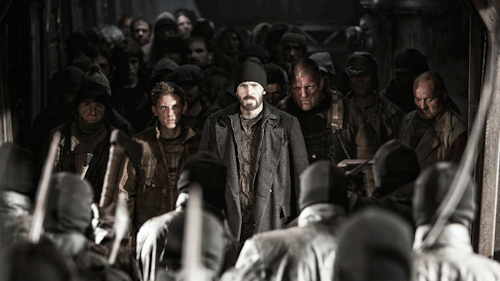
This was the first movie I've seen that in tone evokes the best of my beloved Verhoeven (Robocop and Black Book, specifically) while projecting it's own unique, extreme identity. It has a great, simple setup with miles of depth below the surface about a future where mankind's only survivors in a dystopia cram aboard a globe-traversing train to stay alive. The "have-nots," are fed pureed cockroach bars and relegated to the back of the train and are obviously treated like garbage. So of course they stage an awesome rebellion against the "haves," moving forward from car to car until they can take out the unseen boss, and many shocking, violent, and even laugh-out-loud events occur. The movie is gorgeously lensed and does a wonderful job of couching the prescient theme of class war in some great, pulpy genre entertainment. I don't know why Weinstein barely advertised this movie and basically killed it's commercial chances theatrically, but that was ill-advised. This movie is EXCELLENT. There's a scene where a shoe is placed on a character's head that made me me clap - look for it!
4) NOAH
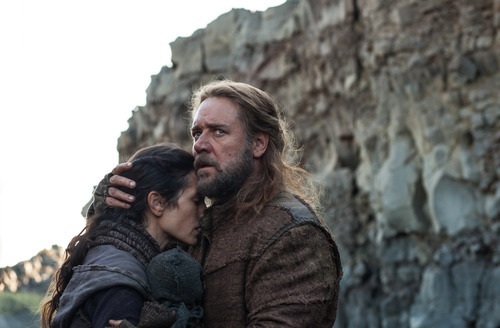
I count myself spiritual but not especially religious, so I went into this movie firstly as a Darren Aronofsky fanatic and secondly as a lover of myth and fan of Russell Crowe's manly charisma. The faith that moves the characters to action, and the human love that interferes and causes some intriguing sub-conflicts made for a much more involving story than I ever expected. There is a strong pro-environmental message that I loved about this movie that I wish was more prevalent in our culture. I never knew I would glean these feelings from yet another telling of the impossible myth of loading all those animals onto a boat, but here we are. Ray Winstone also turned in a great performance playing a basically evil character, who found a way to invest sub-levels of empathy and humanity in scenes that could have easily slipped into cliche.
5) INTERSTELLAR
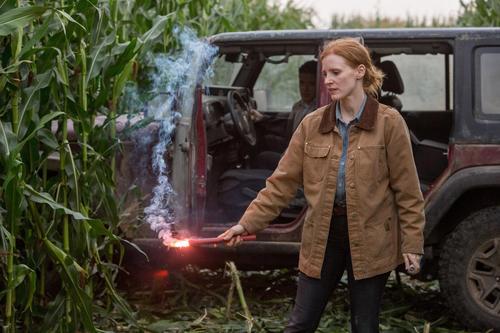
Per my review earlier this year, it was the relationship between father and daughter that reached me in a deep place. The technical achievement of the film is undeniable, and I admit it was a thrill to watch it twice, projected on 70mm at the Chinese. I am still firmly in Christopher Nolan's corner. This is a man with limitless ambition who I'm sure will take us to incredible places over the course of his career.
6) BIRDMAN
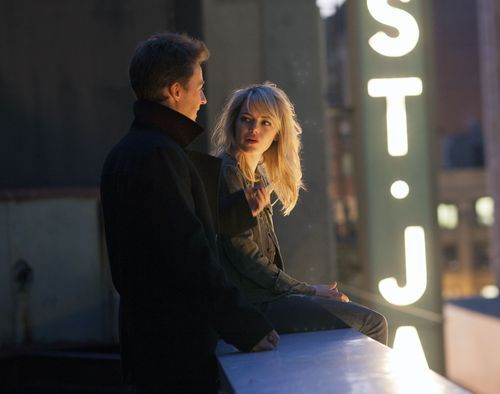
I finally watched this today, and here's the thing: I had been so primed to expect the technical marvel of the movie's stream-of-consciousness, fake-single-take Emmanuel Lubezki genius cinematography that I was far more focused on the interiors of things - the little moments between characters where they either build each other up or tear each other down. Birdman is a bit of a fantasy, but in my limited experience collaborating to make films on a production level, I felt that the movie really encapsulated that feeling of a ragtag family trying to build a kickass production, and all of the struggle and kookiness therein. The characters mostly all try and be good to each other and their worst enemies are themselves, and there were some really beautiful tender exchanges and honest moments that moved me. Also - the scene where Keaton makes a mistake I can easily imagine myself making and goes on an odyssey through crowded NYC in his whitey-titeys is a tour de force.
7) LIFE ITSELF
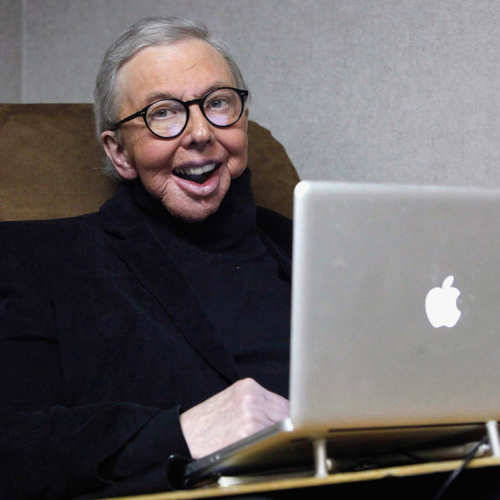
(Roger Ebert documentary) - As much as films themselves shaped my life, the way Roger Ebert's writing (which I read avidly over the years since I was old enough to read) helped me to look at film in a more thoughtful, introspective way. This is a beautiful documentary that I watched at a time when my grandmother was in the hospital struggling with much of what Ebert was struggling with during his final days, and the humor and grace with which America's Favorite Film Critic approached his predicament lifted my heart. Ebert's incredible wife, his relationship with Gene Siskel, his crazy years as a young man who eventually had to put down the bottle for good, are all chronicled here by the director of "Hoop Dreams" in a wonderful way. I'll always admire and miss the powerful insights and funny witticisms of Roger Ebert, and this movie is a great memorial as well as great cinema.
8 & 9) Marvel Tie: Guardians of the Galaxy and Captain America: The Winter Soldier
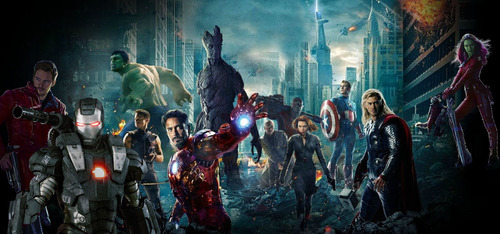
Both so much fun! All that should really be said is that I was never familiar with these characters or comics before viewing these highly-budgeted gems, but I WAS thoroughly pumped and even occasionally moved ("WE ARE GROOT") throughout both of these movies. The Winter Soldier had not one but TWO black superheroes (long overdue, each with their own badass action scene) so much great practical action without lasers or flying (guns, muay thai, car chases) that it took me back a bit to the glory days, when summer meant you could expect to watch something beautifully constructed and fun, but not insulting to basic taste and intelligence (T2 being the ultimate example).
10) JOHN WICK
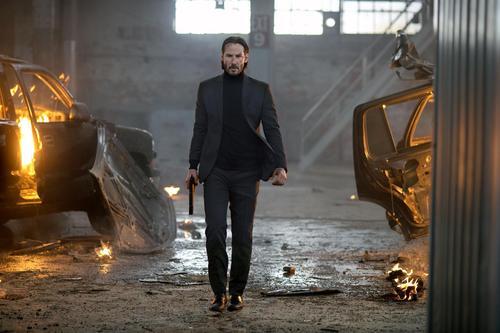
A hands-down badass, meat-and-potatoes action/revenge movie completely committed to knocking you on your ass with perpetual, cleanly-shot and tightly-edited physical combat and gunplay. Keanu has officially inducted himself into the badass canon, even if I still laugh at those old performances he shelled out in Dracula or Point Break. It's clear now that this man needs to be our resident onscreen ass-kicker. It's not a joke anymore! All hail Keanu.
Honorable Mention: CHEF
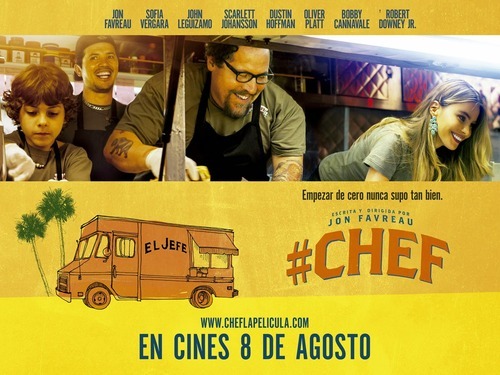
This was my comfort, chicken soup for the soul, throw cold logic to the wind choice for the list. I loved it, while also being fully aware of how much of a sitcom the plot was. There was a little auteur narcissism in there to boot - the plot is a metaphor for how Favreau is a brilliant visionary encumbered by a system that (actually reasonably!) doesn't always give him his way while making billions-grossing Iron Man movies (cry me a river, bud). Also, as the writer, director and star, who does chunky Favreau cast as his girlfriend and ex(ish) wife, respectively?
Scarlett Johansson and Sofia Vergara. Real way to cut this figure down to size!
Despite all this, the movie does an amazing job of depicting the cooking process, visualizing the ingredients in ways that make your mouth water, showing you the messiness and hard work that goes into preparing something as simple as a cuban sandwich. The movie is driven by that time-honored philosophy of "If something is worth doing, it's worth doing with great passion and effort" and that's a sentiment that always hits me hard in the heart-shaped area. Great to watch with the family or a loved one who is hopefully as into cuisine as you are.
- -
I still grieve losses and harbor doubts, but I'm choosing to plunge ahead this year, and get myself smiling more. I'm currently writing a script that I have a great feeling about.
Let's all spend more time at the movies. "Visions come to prepared spirits." - David Milch “I was born inside the movie of my life. The visuals were before me, the audio surrounded me, the plot unfolded inevitably but not necessarily. I don't remember how I got into the movie, but it continues to entertain me.” - Roger Ebert
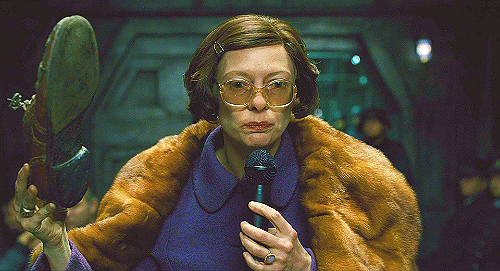
0 notes
Text
Interstellar: Christopher Nolan slips on his Malick Shoes and puts on his Kubrick Hat (Review by Patrick)
Interstellar
Review by Patrick Newman
(Note: I watched the film under optimum viewing conditions: 70mm IMAX at the Grauman's Chinese in Hollywood. NOT as a brag, I just wanted to let you know that I'm evaluating this mega-movie with zero filter - Nolan apparently sipped tea in the very auditorium I watched this in, and deemed the sound and picture values optimum.
Measuring my actual viewing experience against the sight-and-sound-hype we've been all been assaulted with leading up to this, I thought the film looked fucking fantastic, but the sound [and I overheard other theatergoers complaining of the same thing on our way out] was far too overpowering during certain intimate dialogue-driven scenes. Nolan has said in interviews that his sound mix is intended to be very front-loaded with little surround, and he was correct. GREAT for space station-docking awesomeness, inappropriate for the talky parts.
The vast majority of this review contains no spoilers. There's a small paragraph at the bottom with the spoilery bits. Thanks for reading, folks!)
- - -
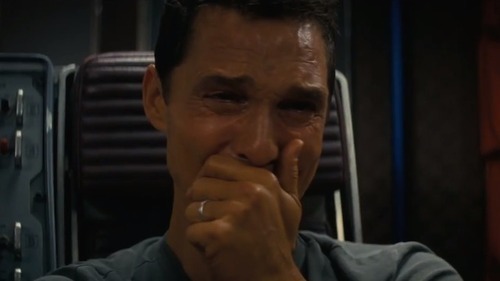
"Interstellar" is the latest insanely hyped/pimped Christopher Nolan joint to reach us since the auteur superstar wrapped up his billions-grossing Dark Knight trilogy and was likely handed another blank "Inception"-check to do whatever the bloody hell he wants (the cuff-linked gentleman speaks with a British accent, so the vernacular fits). Nolan, the producers and cast liken its scope and ambition to 2001 and David Lean films, astrophysicist Kip Thorne was brought onto the project from the script stage as a technical consultant and later Executive Producer, and it's got the top-of-their-games McConaughey and Jessica Chastain anchoring the emotions in a story that sometimes plays like a staid, less ambitious version of Malick's "Creation" sequence in "Tree of Life".
Does it live up to the hype? Does the Emperor have any clothes? Does McConaughey talk about how life in space is a closed circle?
"Interstellar" is about 70 percent cosmic, reality-grounded visual wonder/geekery and 30 percent emotional gut punches. I would have preferred more gut punches...more of an even split.
Yes, the otherworldly exploration sequences, the cool, impeccably and realistically designed aircrafts, the Bill Irwin-bot, and the few extended scenes of space ballet-action are everything the trailers would have you expect.
And yet, I was never truly taken inside the film until those wonderful scenes between father and son, daughter and mentor, brother and sister unfolded amidst the flood of exposition and aeronautical jargon. Once I empathized with the human cost, the strained relationships, and the conflicted priorities of the fairly complex characters, the movie became more affecting to me. It gives me heart that every character is basically trying execute the noblest of efforts: Devising a plan to extend the human lifespan for more than just a single generation for us sorry sons of bitches.
There wasn't a bad scene in the film, but I believe that those who will define "Interstellar" as the cinematic benchmark it intends to be will be physicists, astronauts, and those with consuming hobbies that fall along those lines. The story and dialogue are heavy on the mechanics of space exploration, and the film itself tries to approximate the same wonder we felt watching "2001", when we felt were actually being transported through the cosmos.
"Interstellar" captures those feelings in brief moments and in a few brilliantly-executed sequences (most involving high-speed travel or complex rescue maneuvers), but for me, the visual splendor promised by the trades and the film's creative team fall short of the high watermark set by Christopher Nolan's best films. Still, though, I am one of the many cinema acolytes who LOVE Nolan's continual insistence on shooting on large-format film! It's the big players like this that keep that technology available for us pond-scum dreamers.
You look at the gobsmacking dream-reality-couched-in-heist movie innovation of "Inception," or the comic book mythology brilliantly transplanted into the aesthetic and logic of a Michael Mann-esque crime epic in "The Dark Knight," and one can't help but feel that Nolan slightly missed his strike with this latest two hour-plus opus.
And yet, what is on display here will probably not be attained or replicated for a long time. The heart of the movie lies in the moments when the isolated, undoubtedly crushingly lonely McConaughey ("Coop" in the film) receives transmissions from his son and daughter, and grapples with the flood of emotions that come from touching the possibility of a life that was abandoned long ago.
Most importantly, "Interstellar" looks into our species futures with clear eyes. It poetically reminds us that we need to push our imaginations further than we currently allow ourselves to, or we may not have much of a future at all.
SPOILER WARNING: Seriously bro watch the movie soon like a good fanboy.
There is a cleverly-hidden cameo that pays off in dividends when Good Will Hunting himself pops out of a cryo-freezer, quite surprisingly, to upend McConaughey & Co.'s efforts and break some shit. Like every character in the movie, it must be said, he fights as he does because he believe he is rescuing the human race. Though his actions are destructive, they are the farthest thing from evil because they come from a steel core of love and selfless commitment to the survival of the many, not the emotional fulfillment of the few.
This is a movie that might grow on me in time, but for now, I'll say that it's a great sci-fi drama you won't want to miss on a large-format screen, but it likely won't be the most viscerally or emotionally affecting movie of the year, as the Movie Gods are fond of promising.
Keep making 'em like this, Nolan. You're classing the place up.
Love,
Patrick
1 note
·
View note
Text
Grosse Pointe Blank Review: A Celebration of the High School Reunion
Grosse Pointe Blank
Directed by George Armitage
1997
The symbolic value of the high school reunion looms large in the myopic personal narratives we create for ourselves. In the ten years between marching off of a stage clutching a diploma and stuffing ourselves into dinner clothes for the whirlwind meet-and-greet these reunions so often become, two things happen. We become starkly aware of the different people our lives have led us to be, and we’re conversely humbled by reminders of how so little has changed. In the comedy Grosse Pointe Blank, Martin (John Cusack), the thoughtful, articulate romantic barely a stone’s throw from the boom box toting Lloyd Dobler in Say Anything, has evolved in the ten-year interim into a cold-blooded military-trained assassin (an old English teacher matter-of-factly tells him he “looks like a mortician”). Martin’s return to his high school stomping grounds, prompted by a fiercely loyal and pushy secretary (Joan Cusack) forces the murderous Martin of the present to reconcile with the softer, yearning Martin of yesteryear.
I’ve long found this movie fascinating not just because of the quality writing, performances and directing, but because of the lurking subtext that suggest a much deeper, more cutting and dimensional film than was ultimately projected in 1997. Released just three years after the landmark Pulp Fiction, Grosse Pointe Blank traffics in the same pop culture-saturated, brutally violent, ironic detachment that were commonplace in the late 90’s studios’ rush to replicate Tarantino’s magic formula. In the film’s singular portrait of Cusack’s conflicted hit man, however (with some detours into the lives of a colorful gallery of contract killers and G-Men), the movie taps into a well of feeling more universal and relatable, and it is that aspect of Grosse Pointe Blank that has stayed with me over the years.
We first meet Martin Blank in media res as he meticulously prepares a long-range kill from the vantage of a hotel room, communicating with his secretary through an earpiece. There’s a smattering of amusing Mamet-ese as the pair’s shop talk about ordering cases of hollow point ammunition segues into a pitch for Martin to return home for a high school reunion in Michigan. We get the sense that Martin has been living his life in a very mechanic and dispassionate way, and this may be the key to his effectiveness as a killer. Martin brushes off his secretary’s pitch, murders his target with a single well-placed rifle round…and is abruptly stymied by a rival killer played by David Aykroyd.
Aykroyd’s Mr. Grocer is a standout villain with a goofy square’s crew cut that makes him all the more menacing when you realize the violence he’s capable of. He pops anti-psychotics like M&M’s, can just as easily smile at you as shoot you, and is humorously wounded at Martin’s constant rebuffing of offers of friendship and creative collaboration. If there’s a major difference between Grocer and Martin as their relationship evolves and the body count rises, it’s that between them only Martin suffers from an identity crisis. Grocer gleefully embraces his life as a hired gun, even encouraging his colleagues to band together into a twisted form of unionization. It’s at this notion that Martin chafes, and a genuine conflict emerges – if Martin ever follows through on his desire to reconnect with the human race, it would certainly never be to initiate himself to a Justice League of Grocer’s lunatic killers.
After encountering trouble in the form of Grocer, botching his next hit, and being egged on simultaneously by his therapist (a subtle, note-perfect Alan Arkin) and secretary, Martin decides to confront the life he fled ten years ago and return to Grosse Pointe for his reunion. It’s at this point that the movie really kicks into gear, as Martin’s crazy homicide-strewn professional life collides with the upscale, hermetically sealed hometown he used to know like the back of his hand. The most significant relationship he left behind was a passionate, high school-spanning romance with Debi Newberry (Minnie Driver), and buried within the circumstances of Martin’s abrupt departure from Grosse Pointe (and Debi) are the roots of his decision to commit his life to the taking of lives.
Within several crucial pre-reunion scenes set in Grosse Pointe, we are given scant but telling details of what led Martin to living his post-high school life as a stone-cold sociopath. His father, we gather, was an abusive drunk, his mother is currently living in an institution (having never received the money and care packages Martin sent from afar), and we gather that his puppy love relationship with Debi was resting on a precarious perch by the time Martin turned tail and ran to enlist in the Army. So much of this information is driven by John Cusack’s highly verbose performance that is by turns intense and casual (Roger Ebert said it perfectly that the actor’s gift is to “convincingly look as if he is thinking about words of many syllables”). Cusack walks a tightrope between the astounding havoc he wreaks with his weapons and fisticuffs, and the cautious sensitivity and vulnerability that many of his nonviolent encounters demand of him.
Several important storylines converge at the reunion ceremony, which is truly the high watermark sequence of the film. 80’s pop hits from Siouxie & The Banshees, The English Beat, and others (which are similarly plastered across the entire film – more of the Tarantino influence spilling through) mirror the arrested-development mentality of many of the ceremony’s attendants. Paul (Jeremy Piven) is still hung up on his infatuation with a cheerleader, Bob (Michael Cudlitz) clings to his former identity as drunken cokehead bully to offset his post-graduation ennui, and at the center of it all, Debi and Martin still exude a fiery affection for each other. In a tastefully off-screen sex scene they seem to successfully resolve much of the pain that they’ve experienced while apart, and as they briefly separate to say their goodbyes to other reunion attendant, we acknowledge a kernel of optimism for their lives together.
That is until five minutes later, when Martin’s professional troubles inevitably encroach upon the careful fiction he’s been projecting to the world. An assassin (Karate champion and pro kickboxer Benny Urquidez) with fearsome skills to match Martin’s, accosts him in the high school’s locker hall. The fight choreography in the ensuing scene is brutal, blunt and brief. Cusack, with his height, athleticism and long limbs, is surprisingly convincing at subduing his opponent with a series of kicks before finally stabbing him in the windpipe with a gifted pen (this development gets a big laugh later when he thanks the shill who gave it to him at the reunion entrance). Debi finds Martin kneeling over his opponent’s corpse, covered in bruises and blood, and the movie is reborn into its final phase.
Ironically, what keeps me coming back to this film are the ways that it pauses short of greatness during this final stretch, and my ideas as to why. Despite dialogue that is sometimes too-clever-by-half, a detached irony to the tone of the violence that seems overly derivative of Tarantino’s very distinctive work, and action that can edge too far into parody by undercutting the genuine tension of the story, there are so many fascinating characters and motivations in play that I always ponder the film’s third act with a bemused “what if?” attitude.
There is a great emotional reality to the scene in which Debi confronts Martin at his hotel room and holds him accountable for the decisions he’s made and the murderer he’s become. The contrast between Martin’s Cusackian appeals to charm and wit are stopped cold by Debi’s pragmatism, culminating in Driver’s wonderful delivery of “You don’t get to have me!”
The film’s fatal flaw is that it doesn’t use the harsh bottom line of this scene to springboard Martin into further empathetic development, and instead takes a hard left turn into an action-packed climax with Looney Tunes physics and a total short-changing of Debi’s character. While the hotel scene cements her as the moral center of the film, the ending makes the feeble argument that brutal violence exercised in her defense would be enough to sway her heart back to the sociopathic Martin. It’s a testament to Minnie Driver’s performance that these final action scenes, and the emotional developments within, fail the character completely.
While there is joy to be had in watching the sleazy spooks played by Hank Azaria and K. Tod Freeman meet their gory ends, and even more in Grocer being introduced face-first into a TV set, the ludicrous finale moves too far away from the great central premise to end on an effective note. The unique dynamic of a high school reunion is something we can all relate to. We all move through life leaving heaps of unfinished business behind us, and these ceremonies can provide rare opportunities to reconnect with and even revise those experiences and memories to pave the way for a better future.
The idea of somebody as morally repugnant as a contract killer coming face-to-face with the innocence and potential of his spoiled youth is ripe with drama. Grosse Pointe Blank is two-thirds of a great movie that loses its nerve to follow through on Martin Blank’s journey of self-realization. Somebody should remake it someday, and boldly take this premise to its logical conclusion.
0 notes
Text
Algorithm Review
One of the most remarkable things about Jonathan Schiefer’s “Algorithm” is that it renders both compelling and suspenseful the cinematically stagnant practice of people huddling in dim rooms, interfacing solely with computers. Through the singular point of view of a young idealist living in San Francisco, the thriller explores the prescient concepts of data sharing and tampering in our post-Snowden, WikiLeaks age. The film invites viewers into a dense world of professionals and demonstrates a Mamet-like level of trust in the audience to keep up with the shop talk and technical pursuits of the characters, nearly all of whom are hackers.
Will Stevens (Chris Panzera) sees himself as a God, spending the majority of his days out of the sunlight like a wannabe Neo. Taking freelance hacking jobs for a living like a dot-com private eye, his days are consumed hammering away at his laptop for profit and the occasional anarchist’s amusement. He professes to care solely about the free exchange of information, but over the course of the film we realize his band of fellow hackers form a tightly knit, unconventional family that prove to be unwaveringly loyal to each other and their values. Even as he tends to his obsessions over the nature of information ownership, Will can’t help but awkwardly pursue Bitchan (Paulina Laurant), a long-time friend whose interest unfortunately doesn’t stray far from the platonic.
Will’s disciplined, streamlined lifestyle turns upside down when his close friend, Hash (Raphael Barker) is kidnapped by Homeland Security thugs in the wake of a hack Will makes into a mysterious government program called “Shepherd.” With assistance from his network of hacker outlaws, Will embarks on a journey to rescue his friend from the horrors of the DHS’ enhanced interrogation team (embodied in two surprisingly humorous and lively performances by Byron James and Richard Goeb), hoping to also uncover the nature of the program he hacked in the first place.
Algorithm is novelistic in many aspects, adopting a first-person narrative and using extensive voice over to coax us into identifying with Will as he navigates a world that is mostly of the mind, ones and zeroes. Some of the best scenes are ones in which Will gives detailed explanations of how to hack into a home network through a TV, or how to create a black site worthy of the CIA using little more than aluminum foil. A driving score by Stu Kennedy, which mixes industrial electronic beats with soaring strings, matches the tension and drive of the characters as they unspool Algorithm’s deepening mystery.
The script demonstrates an authenticity and level of detail uncommon for films that use computers and hacking as central plot devices. In this sense it bears kinship with David Fincher films such as The Social Network and The Girl with the Dragon Tattoo, which also made cinematic the practice of hacking and programming. Lines like “We’re not ADHD. We just don’t care that wind speeds on Saturn can get up to 3,000 MPH” recall the obsessions of Max Cohen of Darren Aronofsky’s “Pi.”
The shortcomings of the film mostly have to do with the reconciliation of the expansiveness and ambition of the film’s concept with the limited budget and timetable the production team has brought to bear. Though Satsuki Murashige’s naturalistic cinematography would make Robert Elswit proud in its sharp rendering of San Francisco’s varied environments, big set pieces such as a break-in to a Homeland Security black site lack the realism and bombastic weight that the epic nature of the story requires. Furthermore, the relationship between Will and Bitchan, loaded with complexity because of the yin/yang of affection and dissension that bubbles to the surface between them over the course of the story, isn’t given the resolution it deserves.
The breadth and depth of convincingly authentic San Francisco locations and atmosphere demands mentioning, as so few productions are able to delve into the famous city with this level of detail (MUNI, steeply-angled housing, fog, and landmarks are featured prominently). Producers Joseph and Phillip Matarrese have successfully collaborated with director Schiefer to create a vision of the city that becomes a character unto itself, just as Scorsese and Allen forged an iconic New York for the silver screen. For a reported budget of less than $10k, this feat is all the more admirable.
Ultimately, the stellar script, thematic timeliness, and detailed immersion into a world rarely explored with such depth in cinema make “Algorithm” well worth a look. While we wait for Michael Mann’s big-budget “Cyber” to bring further life to the debate over information access and high-level hacking, we can revel in Schiefer’s intense, thoughtful piece of filmmaking as the first movie to plant a very necessary flag.
1 note
·
View note